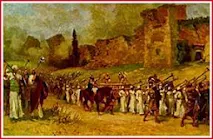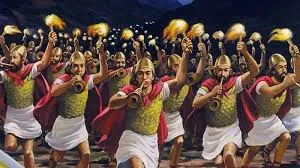Genesis
Genesis means "The beginning." The book begins with the creation. It is full of stories about our first ancestors among which are:
- Adam and Eve
- Cain kills his brother, Abel.
- The Tower of Babel
- Noah and the Ark
- Sodom and Gomorrah are destroyed for their lasciviousness. Only Lot and his daughters and their husbands escape the raining of sulfur and fire. Lot's wife turns to a pillar of salt for disobeying the Lord's angels.
- Abram/later Abraham and Sarah have a son. Abram was 100 and Sarah was 90.
- Abraham makes preparation to offer his only son, Isaac, as a sacrifice until the Lord stopped him.
- Isaac has twins, Jacob and Esau. Jacob deceives his father and receives the greater inheritance and blessing intended for Esau.
- The story of Jacob's Ladder that he saw reach to heaven.
- Jacob wrestles with an angel. Afterwards, God changs Jacob's name to Israel.
- Jacob's son, Joseph, is thrown in a well by his jealous brothers. He is rescued but becomes a servant/slave to a man named Potiphar in Egypt. Potiphar's wife accuses Joseph of misconduct and he is thrown in prison. He later interprets a dream for the pharoah and is given the next highest position. Years later his brothers have to go to Egypt for food to avoid starvation in their homeland. The story continues from there.
- After Joseph died, the Israelite people become slaves for 400 years in Egypt. That's when and where the story of Moses begins.
Exodus means to exit. The exit was from Egypt. Moses led the Israelite people out of slavery in Egypt where for 400 years they had been held slaves. Moses is believed to have written the book of Exodus.
Leviticus
Leviticus has to do with laws. Because forbidden foods and practices mentioned in Leviticus, once considered wrong, are now allowed, suggests that homosexuality is among them. Lesbianism is also thought to be allowed since it is not specifically mentioned in Leviticus.
Numbers
The Book of Numbers recounts the journey of the Israelites from Mount Sinai through the wilderness for forty years, focusing on their repeated rebellions, divine punishments, and God's continued provision and protection. It includes detailed censuses, ritual purity laws, and the story of the spies sent to scout the Promised Land, ultimately culminating in the next generation's readiness to enter Canaan. (AI Overview, internet)
Deuteronomy
Deuteronomy means “repetition of the law.” This book was written by Moses and is made up of three great sermons delivered by him shortly before his death. The story of how the Ten Commandments came to be are included in this book. It isn't pretty.
Joshua
The book of Joshua recounts the Israelites' conquest and division of the promised land of Canaan, after their exodus from Egypt and forty years of wandering. It focuses on Joshua's leadership following Moses' death, the battles fought to secure the land, and the subsequent distribution of territory among the twelve tribes.
Judges
Samson fell in love with a woman named Delilah. The Philistine rulers offered Delilah a lot of money to lure Samson into telling her the secret of his great strength. Three times she asked him to tell her his secret, and each time he lied to her, but she kept begging until he finally grew tired of her begging and told her: if his head were shaved, his strength would leave him.
That night Samson fell asleep. Then Delilah called a man to shave off the seven braids of his hair, and his strength left him. The Philistines put out his eyes, bound him with chains, and made him work grinding grain in prison.
While Samson was in prison, his hair began to grow again. The Philistines held a great feast to celebrate their victory over Samson. They made Samson come out to entertain them. They put him among the pillars that supported the temple where the crowd gathered. Samson braced himself against two of the pillars with his hands, then pushed with all his might. Down came the temple on all the rulers and 3,000 other people, and they all died. Samson had ruled Israel for 20 years.
Deborah, a prophetess, was leading Israel at the time. The people came to her to have their disputes decided. Deborah sent for Barak and told him the Lord wanted him to take 10,000 men and lead the way to Mt Tabor. Barak refused to go unless Deborah went with him. Deborah agreed to his wish, but told him the honor would then go to her and not him.
Sisera found out that Barak went with his army to Mt. Tabor, so he gathered together his 900 chariots and all his men. Barak and his army pursued Sisera and his army and killed them all but Sisera with swords, but Sisera escaped on foot to the tent of a woman named Jael. He thought she would hide him. Instead she tricked him, and killed him.
Ruth
There was a famine in Israel, so a man named Elimelech of Bethlehem took his wife and their two sons and moved to Moab where there was plenty to eat. While they were there, the man died. His two sons grew up and married Moabite girls, Orpah and Ruth. They had lived in Moab about ten years, and the two sons also died, leaving all three women widowed.
Naomi, the mother-in-law, heard that the Lord had provided food for her people in Israel, so she set out for Judah. There, Ruth met Boaz and became his wife. They had a son and named him Obed. He was to be David’s grandfather.
I Samuel
The book of I Samuel records the lives of the prophet Samuel, for whom the book was named, and the first king of Israel, Saul, and much of the life of David, who was to follow Saul as king. The story of David and Goliath is included in this book. Goliath fought for the Philistines and was 9 feet tall. When Goliath saw David, he made fun of him, but not for long, for David took a stone, put it in his sling, slung it, and it sank into Goliath’s forehead and he died.
There is a great lesson in the telling of this historical event: Don’t judge a man by his outward appearance, but by his heart.
I Samuel and II Samuel were originally two different books, but they were combined into one book with two parts.
II Samuel
II Samuel tells about David as king: the good and the bad. David was an important man in God’s kingdom and was one of Jesus’ ancestors. It was in his hometown of Bethlehem that Jesus was to be born. David’s name appears almost 800 times in the Old Testament and about 60 times in the New Testament.
God blessed David as a warrior and later as a king, but David’s sins brought him much misery. David ruled over all of Israel as God had said he would, and he reigned a total of 40 years. He was 30 years old when he became king.
I Kings
I and II Kings are one book divided into two parts. Beginning with Solomon’s reign, I Kings tells about the history of Israel, including how it came to be divided, about the deeds of the first eight kings to reign over what was left of Israel after Solomon’s death, and about Judah’s first four kings.
The author tells about each ruler’s obedience or disobedience to the covenant between God and the people. Those kings include Saul, the first king, then David and his son, Solomon.
Obedience to God brought peace and prosperity; disobedience and idol worship resulted in war and disaster. I Kings also begins the story of the life of the prophet, Elijah.
II Kings
II Kings continues the stories of the great prophets Elijah and Elisha. It also tells the history of both the northern and southern kingdoms until they were conquered. In both kingdoms, God’s prophets continually warned the people that God would punish them if they did not repent of their sins, but the people would not listen.
The Assyrians captured Samaria and scattered the Israelites throughout their kingdom so they could not get together and cause problems. After moving the Israelites out, the king brought people from other countries into the towns of Israel to live there. These people eventually intermarried with the remaining Israelites, which resulted in the “Samaritans.”
The kingdom of Israel came to an end about 721 B.C.
I Chronicles
1 Chronicles primarily focuses on the reign of King David and his preparations for the temple, highlighting his role in establishing Jerusalem as the religious center. The book begins with extensive genealogies, tracing the lineage from Adam to the tribes of Israel, with a strong emphasis on the tribe of Judah and its priesthood. It then recounts King Saul's downfall and David's rise to power. (Al Overview on the internet)
II Chronicles
Second Chronicles covers the time from Solomon's ascension to the throne (971 BC) until the southern kingdom of Judah was finally carried into exile in Babylon in 586 BC. The focus of the book is on Judah. (Insight for Living on the internet)
Ezra
The book of Ezra provides a much-needed link in the historical record of the Israelite people. When their king was dethroned and captured and the people exiled to Babylon, Judah as an independent nation ceased to exist. The book of Ezra provides an account of the Jews’ regathering, of their struggle to survive and to rebuild what had been destroyed. Through his narrative, Ezra declared that they were still God’s people and that God had not forgotten them.
In the book of Ezra we witness the rebuilding of the new temple, the unification of the returning tribes as they shared common struggles and were challenged to work together. Later, after the original remnant had stopped work on the city walls and spiritual apathy ruled, Ezra arrived with another two thousand people and sparked a spiritual revival. By the end of the book, Israel had renewed its covenant with God and had begun acting in obedience to Him.
Ezra also contains one of the great intercessory prayers of the Bible (Ezra 9:5–15; see Daniel 9 and Nehemiah 9 for others). His leadership proved crucial to the Jews’ spiritual advancement. (from Insight for Living with Chuck Swindoll)
Nehemiah
Nehemiah continues the history of the Jews upon their return from exile in Babylon. Nehemiah went to Jerusalem and led the people in repairing the walls. With Ezra, he provided leadership for the people.
A reoccurring theme of this book is the description of the importance of prayer.
Esther
This book has the name of its leading character, a beautiful Jewish girl whom King Xerxes of Persia chose to be his queen.
The author gives a great deal of attention to the three feasts: the Feast of Xerxes, the Feasts of Esther, and the Feasts of Purim. He also records for later generations the memory of the great deliverance of the Jewish people during the reign of Xerxes, in which event Queen Esther plays a major role.
Esther was scared and worried about her people. Esther’s cousin asked her to go talk to the king. Esther was afraid. No one was allowed to see the king unless he called for them. If he didn’t want to see her, she would be killed!
Queen Esther knew what she had to do. She went to see the king. When he held out his scepter for her to touch, she was very happy. This meant that he wanted to see her. He was so pleased to see her that he said he would grant any request she had up to half of the kingdom.
Esther invited the king and Haman to a banquet. There she told the king about the rule, and she told him that she was a Jew. The king then made a new rule that no Jews would be killed. Esther did what God wanted her to do, and her people were saved.
Job
The book of Job is named for its main character, a righteous man who was very rich. Even after losing everything he owned, and even after suffering from a terrible affliction, Job still trusted in God.
The messages in this book are twofold: although God allows Satan to cause us to suffer, IF we endure and still maintain our trust in God, we will be rewarded. Also, our faith becomes an example to others. Not only did God give Job back everything that he had before, Job’s story is now a permanent part of the Bible.
Job was a very rich man. He had thousands of sheep and camels and cattle and donkeys. He also had ten children whom he loved very much.
Satan did not want Job to be a good man. He asked God if he could test Job. He wanted to prove to God that Job wasn’t as good as God thought he was. God told Satan that he could test Job in any way that he chose, but he could not kill him.
First, all of his cattle and donkeys and camels were stolen. Then his sheep were killed. Next his children were all killed by a windstorm. Finally, he got sores all over his body. Job did not understand his suffering, but he did not turn against God.
Psalms
According to Hebrew tradition, Psalms means “praises,” even though many of the psalms are prayers. The name actually comes from the Greek translation and means stringed instruments and songs sung to their accompaniment. David is thought to have written 73 of the Psalms.
Psalms is a book of prayer and praise. It speaks to God in prayer and of God in praise and in professions of faith and trust. The central theme is that God is the center of life, history, and of all creation. He is the great King, the one to whom all things are subject.
Proverbs
Most proverbs are short, compact statements that express a truth about human behavior. Although the book begins by giving credit to Solomon as the author, in later chapters it becomes clear that he was not the only author.
According to the prologue (1:1-17), Proverbs was written to give “prudence to the simple, knowledge and discretion to the young” (1:4), and to make wise men wiser (1:5). Acquiring wisdom and knowing how to avoid the pitfalls of folly will lead to health and success. Although Proverbs is a practical book dealing with the art of living, it bases wisdom solidly on the fear of the Lord (1:7).
Ecclesiastes (the Preacher)
The problem which faced Solomon, the author of this book, was how he could find happiness and satisfaction. He looked for happiness in science, philosophy, wisdom, pleasure, laughter, drinking, building, gardening, possessions, wealth, and music, but found all of them to be meaningless. Materialism, fatalism, natural religion, and even morality and reputation proved equally meaningless without God. The phrase “under the sun” is found 28 times in this book. The under-the-sun” life is hardly worth living, but under the Son, it is glorious.
Solomon’s message: “Now all has been heard; here is the conclusion of the matter: fear God and keep His commandments, for this is the whole duty of man.
Song of Solomon (or Song of Songs)
In ancient Israel everything human came to expression in words. In the “Song,” love finds words--inspired words that show love’s charm and beauty as one of God’s choicest gifts. The woman’s voice in the “Song” suggests that love and wisdom draw man’s attention and without his realizing that he is being lured. Solomon portrays the woman as being mysterious and beautiful, and he is drawn to her in every way.
The various scenes in the book exalt the joys of love in courtship and marriage. Unfortunately, Solomon put women before God and they caused him to ignore God and turn to their idols. God was so angry with Solomon that he allowed the kingdom of Israel, over which Solomon reigned as king, to be given to another, except for a small portion, following Solomon’s death.
Isaiah
Isaiah is considered to be the greatest of all God’s prophets, mainly because one cannot help but see Christ throughout the book. Many of the passages in Isaiah are prophecies or references to the coming Savior (Jesus).
Isaiah is a prophet that served midway through the reigns of the kings of Judah. His man message is to warn Judah of the results of her rebellion and disobedience--one day they would go into exile.
Prophecies About Christ in Isaiah:
2:2-4 32:1,2
4:2-6 35:5,6,8-10
7:13, 4 40:5,10,11
9:1,2,6,7 42:1-11
11:1-10 53
25:6-9 60
26:1,19 62:2
Jeremiah
Jeremiah was a prophet to the southern kingdom of Judah during the reigns of Judah’s last five kings. He, therefore, ministered before, during, and after the fall of Jerusalem. He labored for more than forty years, proclaiming a message of doom to the stubborn people of Judah.
Jeremiah was threatened in his hometown, tried for his life by the priests and prophets of Jerusalem, put in stocks, forced to flee from King Jehoiakim, publicly humiliated by the false prophet Hananiah, and thrown into a cistern. Jeremiah wrote, “His word is in my heart like a burning fire, shut up in my bones. I am weary of holding it in; indeed I cannot (20:9).
Lamentations - (Mourning)
This is perhaps the saddest book of the Old Testament. In it Jeremiah mourns (laments) over the fall of Jerusalem. The city which meant so much to Israel, the kingdom of David, the temple of God--all had been destroyed. Jeremiah looks back and points out the results of sin.
The book that begins with a lament rightly ends in repentance. Knowing that God is merciful, the author appeals for mercy in prayer to God.
Ezekiel - “The Watchman”
Ezekiel’s ministry was like Jeremiah’s in many ways, especially his theme of present doom and hope for the future. Ezekiel was among the more than 3,000 Jews exiled to Babylon by King Nebuchadnezzar, and there among the exiles he received his call to become a prophet. As a priest-prophet called to minister to the people in exile, his message had much to do with the temple and its ritual.
Daniel
Hosea
Hosea ministered to the northern kingdom of Israel during her last days as a nation. God chose to use Hosea’s home life as an object lesson to Israel. Hosea was told to take an unfaithful wife. After bearing Hosea three children, his wife left home and continued to be unfaithful. God told Hosea to take her back and love her again, which he did, redeeming her for 15 shekels of silver.
Joel
Joel was a common Old Testament name meaning “The Lord is God.” Joel took advantage of a terrible locust plague that had recently occurred in Judah to try to get the people to repent. Joel tried to get the people to return to their Lord who sent the plague “...for He is gracious and compassionate, slow to anger and abounding in love, and He relents from sending calamity.” (2:13)
Amos
Amos, a shepherd from Judah, spoke of judgment to come on Judah and Israel. However, he spoke to people who were not interested in listening, for the noterhn kingdom of Israel was at its height. The people were feeling a false sense of security and had forgotten their covenant with God.
Amos preached three sermons concerning Israel’s wickedness. These were followed by five visions:
locustsfirea plumb linea basket of ripe fruitthe destruction of Israel.
Like most prophets, Amos predicted “doom,” then followed it up with thoughts of deliverance.
Obadiah
Jonah
This book is believed to have been written by Jonah himself. It shows how God extends his message of forgiveness for repentance even to the enemies of Israel. It also shows how God intends for us to obey Him and will use whatever means He must to get our attention and to bring about in us an attitude of willing obedience.
Micah
Habakkuk was written as a conversation between God and the prophet. Habakkuk saw that the leaders were oppressing the poor, sohe asked why God asked the wicked to prosper.
When God revealed His intention to use Babylon as His rod of judgment, Habakkuk was even more troubled, because they were even more wicked than Judah. The Lord’s answer was twofold: (1) wait humbly for the Lord to do what He is about to do, and (2) the righteous will live by faith.
Habakkuk finally realized that God was in control of the unverse and that He was working out His own purpose in His own time. The message: Trust God!
Zephaniah
Zephaniah began his ministry in the early days of the reign of Josiah, the boy king who was only eight years old when he began his reign. He followed two wicked and idol-worshiping kings, and the nation was full of injustices and wickedness. It is quite possible that Zephaniah’s prophecies convinced Josiah to renew the covenant with God, burn all false God worship items, do away with pagan priests, desecrate the high places of the false gods, and reinstitute the Passover celebration. In spite of Zephaniah’s reforms and Zephaniah’s call for repentance, the people refused to turn back to God.
Zephaniah’s message: God’s wrath was coming upon the nations, especially Judah. He ends with words of consolation: Redemption
Haggai
Haggai was a prophet who, along with Zechariah, encouraged the returned exiles to rebuild the temple. Cyrus had issued a decree allowing the Jews to return to Jerusalem to rebuild the tremple. The Samaritans and other neighbors were against the project and managed to halt work until Daris the Great became king. Haggai began to preach in Darius’s second year.
Haggai shows the consequences of disobedience and the blessings of obedience. When the people give priority to God and His house, they are blessed.
Zechariah
Zechariah was concerned about the rebuilding of the temple, and in his first message he warned the people they were to listen to God’s message through the prophets. He ws also interested in their spiritual renewal.
Over a hundred years had passed since the Jews had returned to Jerusalem from captivity in Babylon. The first enthusiasm had passed. The promised time of prosperity had not yet come, and the people were giving up hope. They had become cold, irreverent, neglectful, skeptical, hypocritical, and very arrogant.


















